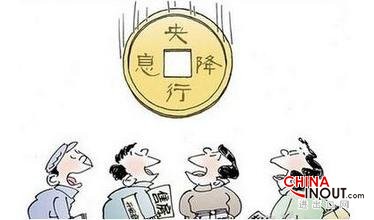中国央行在本周五进行今年内第六次降息,并且它再次降低了银行必须持有的现金储备标准,用以刺激低迷的经济。
在增长速度跌破7%进入二十五年间最低谷的情况之下,这是2008年9月金融危机以来世界第二大经济体所制定的最为激进的货币政策。
中国人民银行称其正通过不再设置存款浮动利率上限来放开利率市场。尽管许多人认为这项举措已经触动深化金融改革的底线,但它对于刺激经济来说十分必要。
中国政府承诺会在几个月内作出的改变,在理论上能够让银行们根据各自的风险来给贷款定价,并消除分析员们口中的失真信贷价格,分析人员称信贷价格失真导致了国内大量的过度投资。
欧洲中央银行说它可以在十二月为中国提供更强进的政策刺激,以应对价格下跌。中国政府在其发表此言前一天释放新政策。
伦敦ETX资本贸易负责人Joe Rundle说:“如今世界上半数的央行都出于宽松模式,我们可能会看见中国释放更宽松的政策。”
中国人民银行在其网站上宣布,自10月24日起,其将下调金融机构一年期人民币贷款基准利率0.25个百分点至4.35%,一年期存款基准利率下调0.25个百分点至1.5%。
金融机构人民币存款准备金率也被下调了0.5个百分点至17.5%。同时,为加大金融支持三农和小微企业正向激励,对符合标准金融机构额外降低存款准备金率0.5个百分点
深夜的新政策于周一的高端会谈前释出,中国的高层领导们将在北京商讨制定中国经济未来五年的发展蓝图。
欧洲的投资者们十分开心,股价大涨。而与此同时,离岸人民币兑美元重挫。
中国人民银行在另一个答辩会议上称:“下一步的货币政策既不会过于紧缩也不会过于宽松,这样才能保证稳健的经济发展。”
它补充说,中国国内放缓的消费者膨胀和减少的市场利率为国家房款存款利率提供了有利条件。
今年对于中国经济来说是个多事之秋。
今夏的股市大跌和八月份人民币汇率贬值让全球市场一片混乱,并引发了对中国经济可能会硬着陆的担忧。这促使中国领导人采取严厉措施向投资者们保证中国经济仍在控制之下。
在周五的政策释放几分钟之前,总理李克强在国家广播电台上说中国会“合理减少”利率和存款准备金率来保证中国经济合理发展。
中国高级领导鲜少对于中国利率或存款准备金率做出直接评价。
在本周,今年第三季度的经济数据表明中国领导人正面临严峻的考验,挑战不仅仅来自实现7%左右的增长目标。
周一出炉的数据表明从七月到九月中国经济增长速度跌至6.9%,这是全球金融危机爆发以来该数字首次破7。
截至到九月份,中国进口额已持续11个月下跌,而生产价格在近三年都出于通货紧缩状态。一些分析员称中国的领导人们已经停止了他们的工作。
Capital Economics的分析员在一份通知中告诉客户说:“我们仍然在等待经济转折的明显标志。”
“我们仍然保留自己的预测——基准利率和存款准备金率在年底会再度下调,而在2016年初会有进一步调整。”(中国进出口网)
China's central bank cut interest rates on Friday for the sixth time in less than a year, and it again lowered the amount of cash that banks must hold as reserves in a bid to jump start growth in its stuttering economy.
Monetary policy easing in the world's second-largest economy is at its most aggressive since the 2008/09 financial crisis, as growth looks set to slip to a 25-year-low this year of under 7 percent.
Yet underscoring China's drive to deepen financial reforms, which many believe are necessary to invigorate the economy, the People's Bank of China (PBOC) said it was freeing the interest rate market by scrapping a ceiling on deposit rates.
The change, which Beijing had promised to deliver for months, will in theory allow banks to price loans according to their risk, and remove a distortion to the price of credit that analysts say fuels wasteful investment in China.

China's policy loosening came a day after the European Central Bank said it could give a bigger policy jolt to the economy as soon as December to fight falling prices.
"We've got half the world's central banks in easing mode," said Joe Rundle, the head of trading at ETX Capital in London. "And we'll probably see more easing from China to come."
The PBOC said on its website that it was lowering the one-year benchmark bank lending rate by 25 basis points to 4.35 percent, effective from Oct. 24. The one-year benchmark deposit rate was lowered by 25 basis points to 1.50 percent.
The reserve requirement ratio (RRR) was also cut by 50 basis points for all banks, taking the ratio to 17.5 percent for the biggest lenders, while banks that lend to agricultural firms and small companies received another 50-basis-point reduction to their RRR.
The late-evening moves come just ahead of a high-level meeting in Beijing starting on Monday wher senior Chinese leaders will thrash out the country's economic blue-print for the next five years.
Investors in Europe took cheer and shares soared, while the Chinese offshore yuan CNH= fell against the U.S. dollar.
"In the next step, monetary policy...will be kept not too loose or too tight to ensure stable economic growth," the PBOC said in a separate question-and-answer session.
It added that China's current muted consumer inflation and falling market interest rates provided a window for the country to liberalize its deposit rates.
It has been a tumultuous year for China's economy.
A summer stock market plunge and shock devaluation of the yuan CNY=CFXS in August roiled global markets and fanned fears of a hard landing, prompting Chinese leaders to take drastic measures to assure investors they have the economy under control.
Friday's easing came minutes after Premier Li Keqiang was quoted on state radio as saying that China will make "reasonable use" of rate and RRR cuts to keep its economy growing at a reasonable pace.
Senior Chinese leaders do not usually comment directly on the country's rate or RRR adjustments.
The cuts came in the same week as sobering economic data for the third quarter that demonstrated the daunting challenges faced by the country's leaders, not least in achieving a growth target of around 7 percent set by the government.
Data released on Monday showed China's economy grew 6.9 percent between July and September from a year earlier, dipping below 7 percent for the first time since the global financial crisis.
With Chinese imports tumbling for the 11th straight month in September and producer prices stuck in deflation for more than three years, some analysts say China's policymakers have their work cut out.
"We're still waiting for clear evidence of an economic turnaround," analysts at Capital Economics said in a note to clients.
"We are retaining our forecast that benchmark rates and the reserve requirement ratio will both be cut once more before the end of the year, with a further move in both early in 2016."











